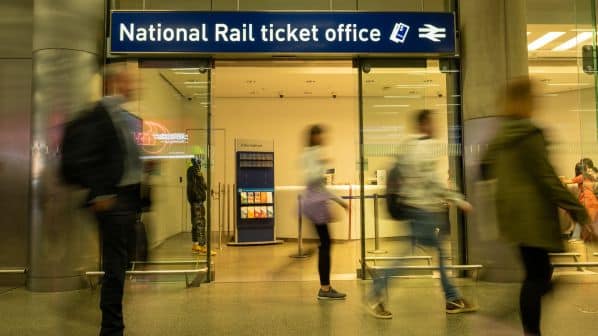PASSENGER operators in Britain have begun public consultation on plans to move staff out of station ticket offices to provide what they say will be “more face-to-face support” for passengers, and which could see the closure of a number of ticket offices in England.
Neither ScotRail nor Transport for Wales (TfW), which are owned by the Scottish and Welsh governments respectively, are affected by the proposals. They also do not apply to Merseyrail, or to London Overground and the Elizabeth Line that are operated under contract to Transport for London (TfL).
Consultation runs until July 26 and the operators say that all ticket office closures will be considered on a case-by-case basis.
The Rail Delivery Group (RDG), which represents operators, says that ticket office staff will transition to multi-skilled customer assistance roles, and would be more able to advise passengers on fares, assist with journey planning and support customers with accessibility needs.
RDG says the changes would mean a more visible and accessible staff presence at stations across the network, on station concourses and on platforms.
The proposals would help bring station retailing up to date, as the current regulations date from privatisation in the mid-1990s “before the invention of the smartphone,” RDG notes.
At that time, 82% of all tickets were sold at ticket offices, compared with an average of 12% today. RDG says that bringing staff out from ticket offices would allow the railway to respond to this “generational shift in customer behaviour.”
This change in customer behaviour has already seen new staffing arrangements introduced by most airlines, many banks and supermarkets in Britain, RDG points out, as well as TfL which has closed all station ticket offices on the London Underground (LU) network.
The proposals come as the rail sector in Britain faces an ever-growing need to reduce costs, "with revenue continuing to languish at 30% below pre-pandemic levels," according to RDG.
According to statistics compiled by the Office of Rail and Road (ORR), total passenger revenue in Britain in the quarter from January 1 to March 31 2023 was £2.2bn. This equates to 70% of the £3.2bn recorded in the same quarter of 2019 before the Covid-19 pandemic, when adjusted for inflation.
The redeployment proposals are also being launched against the backdrop of long-running industrial action by the RMT union representing station staff, which RDG says has refused to ballot its members on a pay offer including a jobs guarantee.
In the latest phase of industrial action, 20,000 RMT members at passenger operators will go on strike on July 20, 22 and 29.
As talks with the RMT have now stalled, RDG says that operators “must now move ahead with essential reforms to bring the industry in line with the modern retailing, while maintaining valuable staff contact for customers.”
The proposed changes would be phased in gradually, including upgrading ticket vending machines (TVMs). RDG estimates that 99% of transactions made at ticket offices in 2022 could have been conducted via a TVM or online.
Ticket office facilities will remain open at the busiest stations and interchanges, selling the full range of tickets while the transition takes place.
Following what RDG says has been extensive and ongoing engagement with accessibility, safety and passenger groups, the operators have made five pledges to passengers about the impact of the proposals:
- across the network as a whole, there will be more staff available to provide face-to-face assistance to passengers on stations than today
- customers will never have to travel out of their way to buy tickets
- those with accessibility needs will always be supported, and
- all staff will be treated fairly and their new roles will be more engaging.
RDG stresses that the reforms will not affect the ability to provide assistance to those needing wheelchair and mobility support from staff on demand at the station. New mobile assistance teams will be created to offer extra help where needed, including at stations which are currently unstaffed.
“Our commitment is that we will always treat our staff, who are hugely valued and integral to the experience our customers have on the railway, fairly, with support and extra training to move into new more engaging roles,” says RDG chief executive, Ms Jacqueline Starr.
“We also understand that our customers have differing needs, which is why the industry widely sought the views of accessibility and passenger groups when creating these proposals, and will continue to through the consultation.”
“The decision to close up to 1000 ticket offices and to issue hundreds of redundancy notices to staff is a savage attack on railway workers, their families and the travelling public,” says RMT general secretary, Mr Mick Lynch.
“Travellers will be forced to rely on apps and remote mobile teams to be available to assist them rather than having trained staff on stations. This is catastrophic for elderly, disabled and vulnerable passengers trying to access the rail network.”
In response, an RDG spokesperson told IRJ: “No redundancy notices have been served on staff. Alongside public consultation, operators have issued a letter to trade unions which opens consultation on managing the transition in a way that minimises the impact of the changes.”




